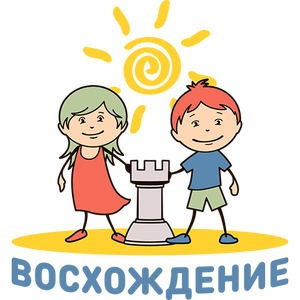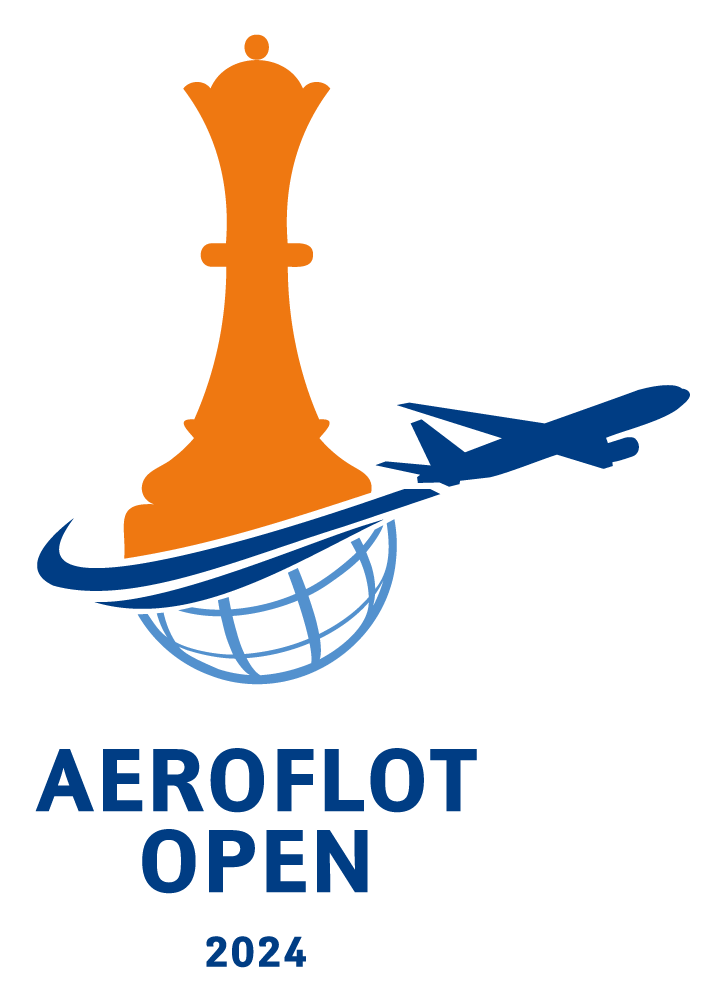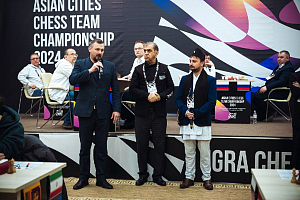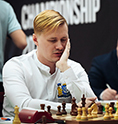Inspired by Anand
Vladimir Barsky’s closing report from the Belaya Ladya final in Dagomys
The 48th Belaya Ladya final saw the Hindu schoolchildren leave no chances to their peers: having scored 31.5 out of 36, they ended up 6.5 points (which is equal to winning two matchups by a big score) ahead of their Armenian peers. However, the term “peers” does not exactly suit the situation: The upper age in Belaya Ladya is 14 years (2003 year of birth), whereas the Hindu boys are 2006 and the girl is 2005. The Hindu won eight matches out of nine and drew only one against Armenia. They seemed like not getting enough play to their hearts’ content, in the meanwhile winning an internet match from the Ugra Chess Academy of Khanty-Mansiysk with a 6.5 to 1.5 score and taking places one and two in the chess study contest, held by Oleg Pervakov, the World Champion in chess composition.
Having scored 25 points, the pupils of Yerevan school № 55 named after A.P. Chekhov took silver. Their championship claim was really short of Artur Davtyan, their last year’s leader. However, he is a 15-year old pupil now, currently shining in the European Men’s Championship in Minsk with an over 2600 performance! This said, other Erevan players’ class is rather high and their second place is a deserved one, although they made their coaches sit on the edge of their seats during the last game day. Armenia was ahead of their nearest pursuers by 4 points, so that taking silver required their making one draw in four games only. The seeming nearness of the coveted goal might have soothed the natives of Erevan, whose matchup against the Sverdlovsk Oblast team started off to a bad start.
The picture shows Samvel Khachatryan in stupor and his head on the table following Artem Pingin’s taking him by surprise with the Sicilian gambit (1.е4 с5 2.b4!?). This game was played by Samvel far below his potential and even ended by his blundering mate in one. Leya Garifullina outplayed Mane Hovhannisyan, and Aivaz Yadigarov defeated Georgy Nanyan. Only David Davtyan managed to make a draw with Roman Kuzmin, thus securing second place for Armenia.
Their opponents (the school’ full name is MAEI (Municipal autonomous educational institution) Lyceum No. 180 Polyforum of Yekaterinburg) took third place in the overall standings and first among the Russian teams. Their main prize comes from the Timchenko Foundation and Renault Russia in the form of this autumn’s trip to France for a match against their French peers. Despite sharing 24 individual points, the additional tiebreakers (the overall number of match points) left the schoolchildren of Novosibirsk behind the Urals team in terms of the overall match points -- 14 versus 15 -- the latter aspect also contributing to Yekaterinburg’s overtaking Armenia and being inferior to India only. The rest of the field's standings have sorted out as follows: 5. The Republic of Tatarstan - 23.5; 6. St. Petersburg; 7. Moscow - to 22.5; 8. Tyumen Oblast; 9. Belarus; 10. Latvia; 11. Astrakhan Oblast - 21.5 points, etc.
As for the Indian team, their prize is taking part in one of the big international tournaments to be held in Russia. This prize was clearly to their liking and our guests met the news with a storm of applause. By the way, the team leaves Dagomys for Voronezh to take part in the Alekhine Memorial. Next year is likely to see the talented juniors in the Aeroflot Open already.
Venkatesan, father of board two Pranav, shared some information about the Hindu schoolchildren:
– The children go to the Velammal Vidyalaya school in Chennai. Vishy Anand’s native city is a a real chess Mecca, the best habitat of chess! Although Velammal Vidyalaya is a comprehensive school, one might say that chess players are in a privileged position there. We have many strong juniors, and I do believe that our team is the strongest in its age group.
Gukesh is our board one. He is fond of chess, works a lot and has an excellent preparation. He became Candidate Master at the age of 8 and is rated world No.1 among children born in 2006.
Pranav took bronze in the latest U10 World Championship, while in 2015 he won the national championship in his age group. Gukesh and he are friends and opponents, so to speak. They often work together and share mutual respect to chess.
Leon is also a good player and a very positive person. However, he plays too quickly sometimes, not getting as deep into the position as he could have.
Rakshitta Ravi is out team’s jewel. She is an excellent player as well, having quite an experience performing in international tournaments in her age group. I think she could have scored more points had luck visited her more often.
– Who coaches the children? Are they masters or grandmasters?
– They have many assistants. A school teacher’s name is Velavan, and he also assisted the team in Dagomys. Besides, Gukesh is tutored by Vijay Annand. Pranav is coached by Ragavi, Leon and Rakshita - by Armir Amish. Rakshita works with Ragavi as well. The school has other strong junior players either, and not so long ago a two-day training session was given to him by Vishy Anand. That was great!
* * *
It is for the fourth time in a row that trivia games, hosted by the Brain Ring world champion Andrey Shumakov, have been part of the Belaya Ladya’s recreation program. This time the list of participants featured 20 teams. The first contest was "What, Where, When?”: the young connoisseurs got questions in writing, and a team giving more correct answers would become a winner. The teams from Krasnoyarsk, Bashkortostan and Tver showed equal results, but the additional tiebreakers (less time for thinking) landed the victory to the Siberians.
Next day gave turn to the media game. This time the questions would be put up on screen. Players were to identify cartoon and movie heroes by their headwear and answer questions aimed at testing attention to details and overall knowlegdeability. Taking the bull by the horns in this contest was the team from Udmurtia, having scored 24 out of 30 points.
And, finally, the ultimate day was a brain ring contest, which had teams competing in terms of answering questions ahead of others. Celebrating victory were the more experienced natives of Tver (the only team making it into the top three in each type of the intellectual programs). Tver took all four battles, including the final one.
A chess composition contest, organized by Oleg Pervakov, took place in two stages. The children started by taking 40 minutes to solve two problems and a study, and those who managed ahead of others would get bonus points. The best eight would then compete to the knockout. The host arranged a mate in two setup on the board for two opponents to solve it. The one to solve it first would get a point, should the answer be incorrect, a point would go to the opponent. The final, held to five points, had Gukesh scoring a tough 5:4 win over Pranav.
Head coach of the national chess teams Sergey Janovsky gave several master classes, analyzing the most instructive games of the tournament. In the end he awarded prizes to three best games of the 2017 Belaya Ladya final. Given below is a game that was given the first place.
Polukhin (Voronezh Oblast) - Babaian (Stavropol Krai)
1. d4 Nf6 2. Nf3 d5 3. Bf4 e6 4. e3 Be7 5. Bd3 0-0 6. Nbd2 b6 7. c3 Bb7 8. Ne5 c6 9. Qf3 Nbd7 10. Qh3 c5 11. Ndf3 Ne4 12. Nxd7 Qxd7 13. Ne5 Qd8 14. f3 Nf6 15. g4 g6 16. Qg2 Re8 17. h4 Bf8 18. h5 Bg7 19. hxg6 hxg6 20. Qh3 Qe7 21. Bg5 Red8 22. Bh6 Qf8 23. Bg5 Qe7 24. Rd1 c4 25. Bb1 b5 26. Rd2 a5 27. Rdh2 b4

28. Qh8+ Bxh8 29. Rxh8+ Kg7 30. Bxf6+ Kxf6 31. g5+ Kxg5 32. f4+ Kf6 33. Ng4+ Kg7 34. R1h7#.
The open all-Russian competition Belaya Ladya is co-organized by the Russian Chess Federation and the Ministry of Sports of the Russian Federation. The competition is also supported by Ministry of Education and Science of the Russian Federation, the Elena and Gennady Timchenko Charitable Foundation, Renault Russia, the Federal Grid Company of Unified Energy System (FGC UES), and PhosAgro.
Beginning with 2015, the final has been elevated to the status of an international event. This year’s edition featured 97 teams from 80 regions of Russia and 17 teams from abroad. Schoolchildren from Armenia, Belarus, Israel, Kazakhstan, Kyrgyzstan, China, Latvia, Moldova, Mongolia and Estonia have been joined by their peers from England, Bulgaria, Greece, India, Poland, Romania and Slovakia, first-timers to Belaya Ladya.
Given below is a small album with a few pictures for you to have a look at. We would like to repeat a small guideline for downloading pictures to your liking for those of you who are new to our website: position the cursor right over the picture’s middle (a handle-shaped cursor turns into an arrow-shaped one), then right-click and select "save image as". I wish you a pleasant viewing and see you again in Dagomys!
Pictures by Vladimir Barsky




































